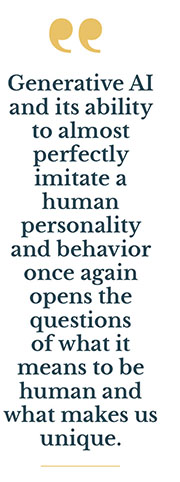We are witnessing an explosion of generative AI tools and applications and their emergence and potential impact is being likened to the creation of computers, introduction of social media, or even the switch from using horse-drawn carriages to the motorcar. We can only guess what the consequences will be, but it is safe to say, they will be far reaching and unprecedented. Many paradigms we took for granted are shaken to their foundations: we encouraged people to develop digital skills and join STEM fields, being sure of the need for highly skilled jobs, or ensuring ourselves that automation could never replace the creativity or imagination of humans.
 With the emergence of generative AI none of that is true anymore, as AI can do research, compose emails, write academic essays or even fix the mistakes in your code. AI can now compose music, create images, do almost errorless text-to-speech translation, even create design packages according to specific instructions. What it cannot do (yet), on the other hand, is to guarantee the truth and correctness of the information it provides, or to create something unique. This development clearly presents an opportunity for democratization of access to information, personalized healthcare or education, but also poses great risks (openly admitted by its creators) of spreading misinformation, propaganda, harmful content in the online space or facilitating more advanced cybersecurity threats.
With the emergence of generative AI none of that is true anymore, as AI can do research, compose emails, write academic essays or even fix the mistakes in your code. AI can now compose music, create images, do almost errorless text-to-speech translation, even create design packages according to specific instructions. What it cannot do (yet), on the other hand, is to guarantee the truth and correctness of the information it provides, or to create something unique. This development clearly presents an opportunity for democratization of access to information, personalized healthcare or education, but also poses great risks (openly admitted by its creators) of spreading misinformation, propaganda, harmful content in the online space or facilitating more advanced cybersecurity threats.
Generative AI and its ability to almost perfectly imitate a human personality and behavior once again opens the questions of what it means to be human and what makes us unique. More frequent interaction between humans and machines seems to be an essential and hardly questionable element of our future. However, it is still up to us, humans, how we will use this to address global challenges such as lack of trust and growing polarization in society, unequal treatment of vulnerable groups or the progressing climate disaster we are facing. Technology can amplify our efforts, but the decision of what our future will look like is in our hands.
Kristína Gotthardová, Policy Officer, AmCham Slovakia
Tomáš Jucha, Senior Policy Officer, AmCham Slovakia




Follow us